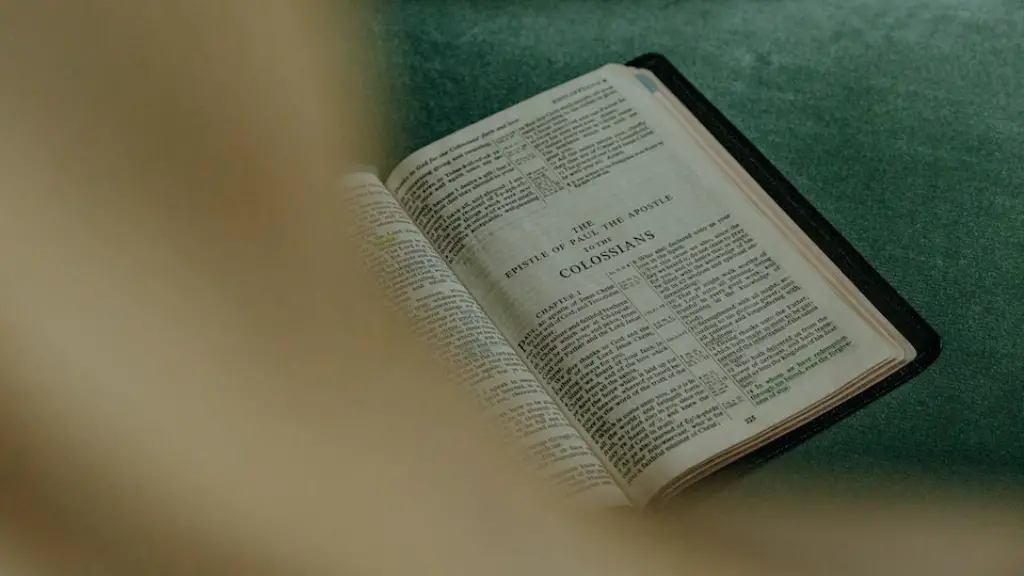What Does Deliverance Mean In The Bible
The Bible speaks often of the concept of deliverance, but what does it actually mean in practice? People of faith have long been taught that deliverance is a divinely given miracle that is used to free people from oppression or suffering. The concept of “deliverance” comes from Exodus 19:4, where Moses pleads with God to be the leader that sets Israel free. In this context, deliverance is the freeing of the Hebrew people, leaving Egypt and erasing the suffering of slavery. This is one of the clearest examples of deliverance found in the Bible, but the idea of deliverance is expanded upon throughout the scriptures.
In Psalm 18:2, King David refers to God as “my rock and my deliverance,” which is an expression of his reliance on the Lord. In this connection, deliverance can be seen as an act of divine intervention, an offering of strength and safety. God, in this instance, is the force that helps his people overcome the challenges that life throws at them. In a similar sense, the book of Psalms is a collection of prayers where David expresses his trust and faith that God will provide deliverance from distress.
The Apostle Paul frequently uses the language of deliverance when discussing his far-reaching mission. As he travels and evangelizes, he encourages his audiences to be free of their worldly constraints and gain a spiritual release. He talks of having been called and “delivered” by the Lord, and grants comfort and hope to those seeking freedom and solace. The prison epistles of Paul make clear that his deliverance is personally connected both to his imprisonment but also to an internal transformation and growth.
Further testament to the idea of deliverance is found in the book of Nehemiah. When the people of Israel return to Jerusalem, the walls and city gates are destroyed, leaving them vulnerable to invaders. Nehemiah leads the rebuilding efforts and restores the city to its former glory. In this case, deliverance is synonymous with physical liberation and empowerment. The fortified walls represent a break from the oppression and hardship of captivity, and mark the return of human freedom.
Similarly, the story of Esther speaks to the idea of deliverance from physical danger. When Esther’s uncle Mordecai visits the Persian court, he finds that he himself is in danger of execution. But Esther bravely intercedes for the safety of her people and is miraculously able to save them. This is yet another example of deliverance being connected to freedom from persecution and a greater sense of redemption.
The concept of deliverance comes up frequently in the Bible but it’s not always clear what it actually looks like. In many cases, deliverance is presented as a breakthrough from physical danger and suffering, as is seen in the stories of Moses, Nehemiah and Esther. It can also be seen as an act of spiritual liberation, where God provides comfort and hope to those in need. Deliverance, ultimately, is about being released from bondage and restored to the freedom that God desires for all His people.
Deliverance in Psalms
The concept of deliverance is particularly prominent in the Psalms, the Hebrew bible’s book of prayers. Created over a period of two or three hundred years, the Psalms were intended to capture the sorrows, joys and worries of a people constantly navigating faith and life on an individual and collective basis. Throughout, the Psalms are alive with references to deliverance, primarily in relation to God’s promise to always intercede for them.
In Psalm 18—probably written by David himself—the Psalmist expresses his deep faith in God, calling Him the “rock and my deliverer”. This is an expression of his hope when faced with difficulty, and assurance in God’s power and protection. In Psalm 40, too, the Psalmist calls out for deliverance, crying out to God for salvation.
The Psalms are marked by a strong sense of sincerity, and each prayer reflects the trial and tribulations faced by the people of Israel. Even when faced with the most difficult of life’s struggles the Psalmist proclaims faith in a higher power, claiming that God alone can and will provide rescue and deliverance. Through expressing joy and sorrow, doubt and belief, the Psalms speak of the sheer power of human faith.
The book of Psalms is widely referred to as Israel’s national hymnbook, a living reminder of God’s faithfulness in moments of darkness. Delivered over countless generations, the words of the Psalms remind us of the power of deliverance, and how it is only through surrendering our burdens to God that we can truly be liberated.
Deliverance in the New Testament
The concept of deliverance is also prominent in the New Testament, specifically in the context of Jesus’ mission. In the Gospels, Jesus is often referred to as the liberator of the oppressed, and He frequently refers to deliverance and redemption in relation to His message.
In Matthew 11:12, Jesus says, “Whoever has faith in me will have their sins forgiven and be set free.” This highlights the link between Jesus and deliverance, in that it is through faith that we can receive the release we are seeking. In a similar sense, Jesus proclaims in Mark 2:17 that he is here to “heal the sick and bring deliverance to the oppressed.” In this instance, deliverance is presented as something that can be attained through action and relationship, which is made possible by faith in Jesus.
The Apostle Paul is another key figure in the New Testament that references deliverance often. Throughout his letters to the churches and communities he encountered, he speaks of his own identity as a deliverer of the gospel. One instance of this is found in Galatians 1:15, when Paul proclaims that “God set me apart to preach His good news and tell them about the greatness of his deliverance.” Here, it is clear that Paul’s mission is linked to an ongoing dialogue about the power of deliverance found in Jesus.
When looked at from a Christian perspective, deliverance is not only about being released from physical captivity but is also about finding a pathway out of spiritual desertion. For the Apostle Paul, deliverance is polyvalent — a human and divine act of transformation, restoration and redemption.
In Corinthians 10:25, Paul further explains how deliverance is connected to freedom and peace, both in body and spirit. Deliverance is a summonsing forth of strength to tackle life’s obstacles and redeem ones soul. Holding on to this idea brings hope and understanding — ensuring faith and love go hand in hand.
Deliverance in Contemporary Society
Although originally presented as a act of divine intervention in the Bible, deliverance can be seen as a contemporary call to action for those looking for relief. It is an ethical imperative that on an individual and collective basis commands freedom from the constraints of injustice and neglect.
In today’s society, the need for deliverance is more prevalent than ever, with increasing global disparities and harsh realities that require our attention. We are called upon to take responsibility, to act on the knowledge we have, and to seek solutions to the world’s problems. The contemporary interpretation of deliverance may reflect the concept of personal evolution, the desire to unlearn the toxic elements of society and stand in solidarity with those in need.
In the modern age, deliverance is no longer about physical liberation alone but also mental emancipation. To overcome oppression and suffering, we turn to faith as a source of deliverance and hope. We open our minds and hearts to possibilities and potential. We must strive to be open to learning and discovering — even though progress may be slow and convictions firm — to continue to seek out ways of deliverance that reflect God’s desire for justice and peace in our lives.
Deliverance, then, is about understanding. It is about cleansing. It is about surrendering our pain and allowing faith, courage and justice to break through the darkness. It is about seeing the world as full of possibility and chance — and believing that it is our duty to seek it out.
The Challenge of Deliverance
Every individual has a unique experience of deliverance, but often we struggle to recognize the power within our own lives. We become complacent in our comfort and content in our cures, but these are only temporary fixes that can often lead to further entrapments.
To find true deliverance, we must challenge ourselves and push ourselves to go further. We have to be willing to look at all of the uncertainty and discomfort in our lives, and actively seek out new solutions. We have to be willing to release the doubts and anxieties that keep us from believing that the world can and will be better.
The challenge of deliverance lies in our willingness to dive deep into the unknown, to accept that the path will not be easy, and to hold firm to faith. Deliverance is a journey that requires us to reach beyond ourselves and call upon the help of God to guide us and sustain us.
The Bible tells us that deliverance is obtainable, and that it can be found in the smallest moments of gratefulness between trials. Only by staying true to God’s will, by trusting in faith, and by relying on love can we find deliverance.
The Call of Deliverance
It is important to remember that deliverance is not only found in the Bible, but in ourselves and our relationships with one another. Deliverance is an invitation to freedom and redemption when we offer kindness despite our differences and stand together in solidarity for a greater good.
In the words of Martin Luther King, Jr., “We must remember that we may have all come on different ships, but we’re all in the same boat now.” This is the call of deliverance, to recognize our common humanity and create an ideal world where justice, peace and hope prevail.
Deliverance is about seeing the beauty in the brokenness and understanding that we can only grow with kindness and love. We can only de-condition our minds to set ourselves free when we are willing to actively seek healing beyond ourselves. Deliverance is a lifelong pursuit that requires a commitment to faith and resilience in the face of fear.
The power of deliverance requires us to take responsibility for our circumstances and to recognize that it is only through looking within and trusting in the possibilities of our hearts that we can discover true deliverance.





